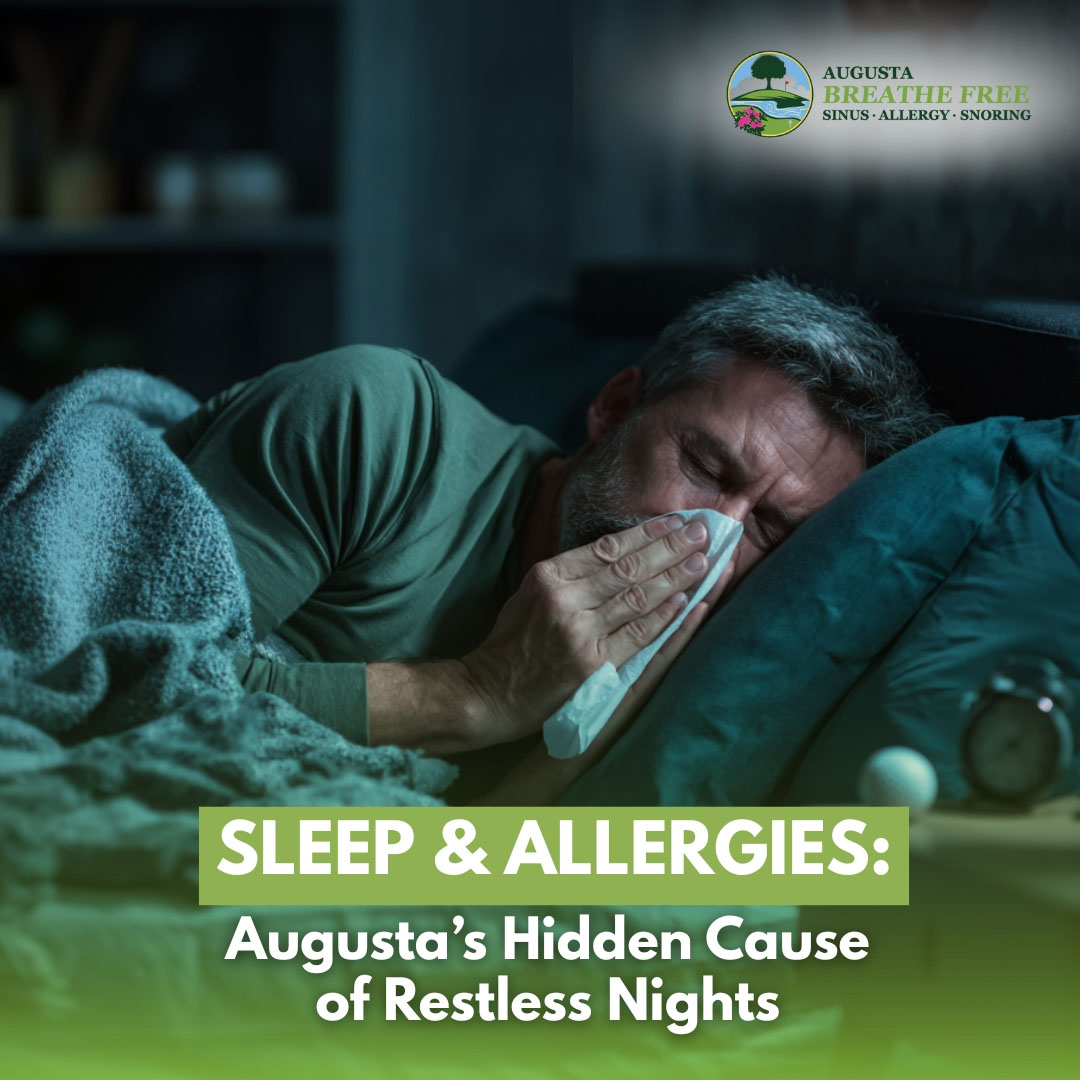Sleep & Allergies:
Augusta’s Hidden Cause of Restless Nights

A good night’s sleep and adequate rest every night are crucial for maintaining physical, mental, and emotional health, as well as overall well-being. However, if you find yourself constantly dealing with allergies and frustrating symptoms like a runny nose, frequent sneezing, itchy and watery eyes, and headaches, then you know better than anyone that allergies can be more than just an inconvenience.
If left untreated, allergies can significantly disrupt daily life and impact sleep, leading to restless nights and foggy mornings. Poor quality sleep, in turn, impacts daily functioning, mood, and overall health and well-being.
If you want to put an end to restless nights of sneezing, nasal congestion, a runny nose, and itchy eyes, it’s important to understand the link between allergies and sleep.
Understanding Allergies
Allergies are the immune system’s response to typically harmless substances called allergens. When exposed to allergens, the immune system mistakes them for a threat, prompting the release of a chemical called histamine to fight off the “threat”. This causes inflammation, leading to symptoms like nasal congestion, frequent sneezing, a runny nose, and itchy and watery eyes.
Common allergens include pollen, dust mites, pet dander, and mold spores.
How Allergies Impact Sleep
Several allergy symptoms can impact and interfere with sleep:
⭕Nasal Congestion
Nasal congestion is a common symptom of allergies. Blocked nasal passages make it difficult to breathe through the nose. This forces the person to resort to mouth breathing, which is less efficient and can contribute to snoring and sleep disturbances, and even worsen sleep apnea symptoms.
⭕Coughing
Another common allergy symptom is postnasal drip, which is characterized by mucus dripping down the back of the throat. This triggers coughing fits, which can get worse when lying down to sleep. This disrupts sleep, leading to restlessness and difficulty sleeping or staying asleep throughout the night.
⭕Itchy eyes and throat
Persistent itching of the eyes and throat irritation can be very uncomfortable. This stops the person from feeling relaxed enough to sleep and rest. This prevents deep, restorative sleep, leading to restlessness during the night and fatigue during the day.
⭕Snoring and sleep apnea
While allergies are not a direct cause of sleep apnea, they can contribute to nasal obstruction and may worsen symptoms in individuals with existing sleep apnea.
When allergies occur, there is nasal blockage that makes it difficult to breathe through the nose. This leads to mouth breathing, which can increase snoring and contribute to worsening sleep apnea. This results in restlessness at night, frequent sleep disruptions, and daytime sleepiness, impacting daytime functionality and overall well-being.
⭕Daytime fatigue and sleepiness
If left untreated, allergies can lead to poor quality sleep and frequent restlessness at night. This causes daytime fatigue and sleepiness, affecting work, school, daily functioning, and overall well-being.
Tips to Get a Good Night’s Sleep Despite Allergies
Sleeping with allergies can be tough. Here are some tips to help you get a good night’s sleep despite the frustrating symptoms:
✅Keep your home clean and dust-free as much as possible.
✅Close your doors and windows to keep allergens out of your home.
✅Shower and change into fresh clothes before bed.
✅Take allergy medication at night.
✅Use an air purifier to create a cleaner sleeping environment.
✅Consult with your allergist for advanced treatment options.
- Allergy testing to get a better understanding of your unique allergy profile
- Immunotherapy for long-term allergy relief
- CPAP (continuous positive airway pressure) machine to keep the airways open and deliver steady air pressure, which is also the standard treatment for sleep apnea when prescribed by a sleep specialist after a confirmed diagnosis.
- Balloon sinuplasty is a minimally invasive procedure that opens blocked sinus passages and may improve breathing and reduce nasal congestion that contributes to sleep disturbances.
- Septoplasty to address a deviated septum, which may help improve nasal airflow during sleep.
Breathe and Sleep Better With Augusta Breathe Free
Here at Augusta Breathe Free, we understand the distinct relationship between allergies and sleep quality. Our team of allergy and ENT specialists understands how allergies can be the hidden cause of restless nights for many Augusta residents, and we are here to help.
Schedule a consultation today and explore effective solutions that may help improve breathing and sleep quality over time.



